美国文学-The Triumph of the Egg
- 格式:dps
- 大小:584.50 KB
- 文档页数:2
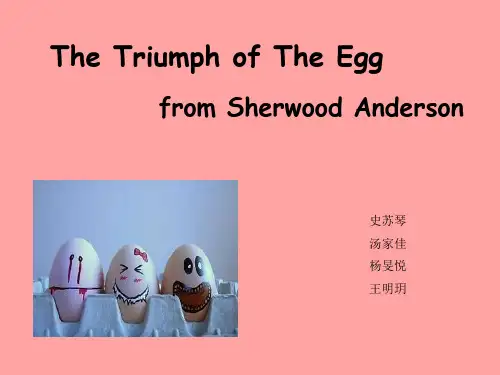
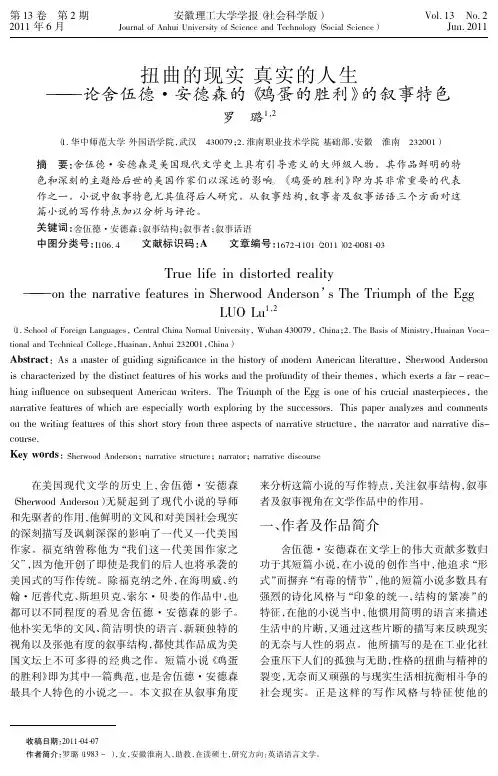
第13卷第2期安徽理工大学学报(社会科学版)Vol.13No.22011年6月Journal of Anhui University of Science and Technology (Social Science )Jun.2011扭曲的现实真实的人生———论舍伍德·安德森的《鸡蛋的胜利》的叙事特色罗璐1,2(1.华中师范大学外国语学院,武汉430079;2.淮南职业技术学院基础部,安徽淮南232001)摘要:舍伍德·安德森是美国现代文学史上具有引导意义的大师级人物。
其作品鲜明的特色和深刻的主题给后世的美国作家们以深远的影响。
《鸡蛋的胜利》即为其非常重要的代表作之一。
小说中叙事特色尤其值得后人研究。
从叙事结构,叙事者及叙事话语三个方面对这篇小说的写作特点加以分析与评论。
关键词:舍伍德·安德森;叙事结构;叙事者;叙事话语中图分类号:I106.4文献标识码:A文章编号:1672-1101(2011)02-0081-03收稿日期:2011-04-07作者简介:罗璐(1983-),女,安徽淮南人,助教,在读硕士,研究方向:英语语言文学。
True life in distorted reality———on the narrative features in Sherwood Anderson ’s The Triumph of the EggLUO Lu 1,2(1.School of Foreign Languages ,Central China Normal University ,Wuhan 430079,China ;2.The Basis of Ministry ,Huainan Voca-tional and Technical College ,Huainan ,Anhui 232001,China )Abstract :As a master of guiding significance in the history of modern American literature ,Sherwood Anderson is characterized by the distinct features of his works and the profundity of their themes ,which exerts a far -reac-hing influence on subsequent American writers.The Triumph of the Egg is one of his crucial masterpieces ,the narrative features of which are especially worth exploring by the successors.This paper analyzes and comments on the writing features of this short story from three aspects of narrative structure ,the narrator and narrative dis-course.Key words :Sherwood Anderson ;narrative structure ;narrator ;narrative discourse在美国现代文学的历史上,舍伍德·安德森(Sherwood Anderson )无疑起到了现代小说的导师和先驱者的作用,他鲜明的文风和对美国社会现实的深刻描写及讽刺深深的影响了一代又一代美国作家。
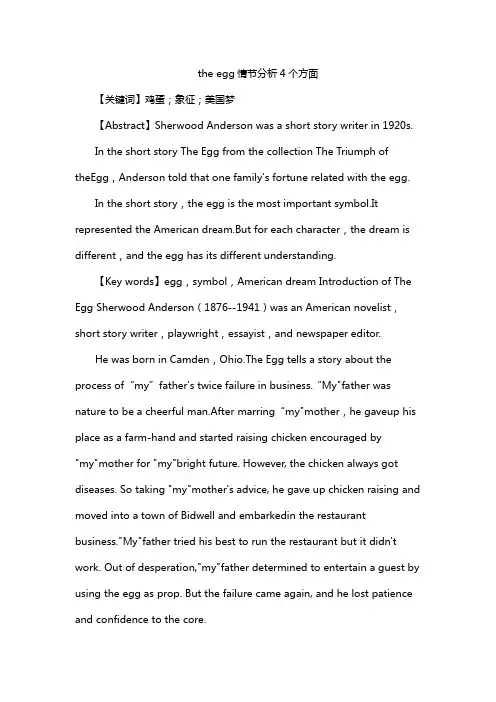
the egg情节分析4个方面【关键词】鸡蛋;象征;美国梦【Abstract】Sherwood Anderson was a short story writer in 1920s.In the short story The Egg from the collection The Triumph of theEgg,Anderson told that one family's fortune related with the egg.In the short story,the egg is the most important symbol.It represented the American dream.But for each character,the dream is different,and the egg has its different understanding.【Key words】egg,symbol,American dream Introduction of The Egg Sherwood Anderson(1876--1941)was an American novelist,short story writer,playwright,essayist,and newspaper editor.He was born in Camden,Ohio.The Egg tells a story about the process of“my”father's twice failure in business.“My"father was nature to be a cheerful man.Afte r marring“my"mother,he gaveup his place as a farm-hand and started raising chicken encouraged by "my"mother for "my"bright future. However, the chicken always got diseases. So taking "my"mother's advice, he gave up chicken raising and moved into a town of Bidwell and embarkedin the restaurant business."My"father tried his best to run the restaurant but it didn't work. Out of desperation,"my"father determined to entertain a guest by using the egg as prop. But the failure came again, and he lost patience and confidence to the core.I. Symbol of "the egg"Sherwood Anderson lived in Midwestern America at the end of the nineteenth century and belonged to those who had watched how people pursued their American Dream and got disappointed before the First World War. American dream implies an opportunity for Americans toachieve prosperity through hard work. According to The Dream, this includes the opportunity for one's children to grow up and receive a good education. It is the opportunity to make individual choices without the prior restrictions that limited people according totheir class, religion or ethnicity. As the most important symbol, the egg assumes association beyond those of the culinary."The egg"is always related with the narrator's family especially his father, but in each period it represents different symbolic meanings.。
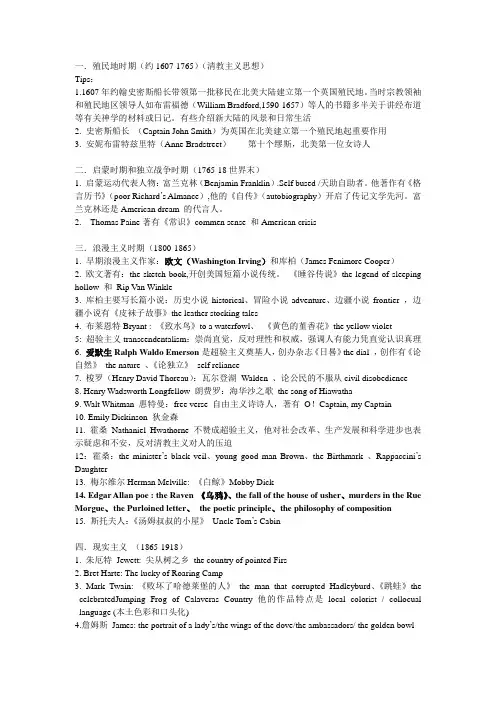
一.殖民地时期(约1607-1765)(清教主义思想)Tips:1.1607年约翰史密斯船长带领第一批移民在北美大陆建立第一个英国殖民地。
当时宗教领袖和殖民地区领导人如布雷福德(William Bradford,1590-1657)等人的书籍多半关于讲经布道等有关神学的材料或日记。
有些介绍新大陆的风景和日常生活2. 史密斯船长(Captain John Smith)为英国在北美建立第一个殖民地起重要作用3. 安妮布雷特兹里特(Anne Bradstreet)------第十个缪斯,北美第一位女诗人二.启蒙时期和独立战争时期(1765-18世界末)1. 启蒙运动代表人物:富兰克林(Benjamin Franklin).Self bused /天助自助者。
他著作有《格言历书》(poor Richard’s Almance),他的《自传》(autobiography)开启了传记文学先河。
富兰克林还是American dream 的代言人。
2. Thomas Paine著有《常识》commen sense 和American crisis三.浪漫主义时期(1800-1865)1. 早期浪漫主义作家:欧文(Washington Irving)和库柏(James Fenimore Cooper)2. 欧文著有:the sketch book,开创美国短篇小说传统。
《睡谷传说》the legend of sleeping hollow 和Rip Van Winkle3. 库柏主要写长篇小说:历史小说historical、冒险小说adventure、边疆小说frontier ,边疆小说有《皮袜子故事》the leather stocking tales4. 布莱恩特Bryant : 《致水鸟》to a waterfowl、《黄色的堇香花》the yellow violet5: 超验主义transcendentalism:崇尚直觉,反对理性和权威,强调人有能力凭直觉认识真理6. 爱默生Ralph Waldo Emerson是超验主义奠基人,创办杂志《日晷》the dial ,创作有《论自然》the nature 、《论独立》self reliance7. 梭罗(Henry David Thoreau):瓦尔登湖Walden 、论公民的不服从civil disobedience8. Henry Wadsworth Longfellow 朗费罗:海华沙之歌the song of Hiawatha9. Walt Whitman 惠特曼:free verse 自由主义诗诗人,著有O!Captain, my Captain10. Emily Dickinson 狄金森11. 霍桑Nathaniel Hwathorne 不赞成超验主义,他对社会改革、生产发展和科学进步也表示疑虑和不安,反对清教主义对人的压迫12:霍桑:the minister’s black veil、young good man Brown、the Birthmark 、Rappaccini’s Daughter13. 梅尔维尔Herman Melville: 《白鲸》Mobby Dick14. Edgar Allan poe : the Raven 《乌鸦》、the fall of the house of usher、murders in the Rue Morgue、the Purloined letter、the poetic principle、the philosophy of composition15. 斯托夫人:《汤姆叔叔的小屋》Uncle Tom’s Cabin四.现实主义(1865-1918)1. 朱厄特Jewett: 尖从树之乡the country of pointed Firs2. Bret Harte: The lucky of Roaring Camp3. Mark Twain: 《败坏了哈德莱堡的人》the man that corrupted Hadleyburd、《跳蛙》the celebratedJumping Frog of Calaveras Country他的作品特点是local colorist / collocual language (本土色彩和口头化)4.詹姆斯James: the portrait of a lady’s/the wings of the dove/the ambassadors/ the golden bowl5. Stephen Crane: 商场描写战争,著作有《红色英勇勋章》the red badge of courage6. Jack London: Martin Eden The call of wild7. Theodore Dreiser: Sister Carrie An American Tragedy五.现代主义时期(the lost generation)1. Ezra Pound庞德:The Cantos Hugh Selwyn Mauberley2.Eugene O’neill: 《天边外》Beyond the Horizon Emperor Jones The hairy Ape3. Edith Whaton: 《快乐之家》the house of Mirth 《天真时代》the age of innocence4. Lewis刘易斯:《大街》Main Street 《巴比特》Babbit5. Sherwood Anderson: Winesburg, Ohio6. John Steinbeck : (大萧条时期) the grapes of Wrath7. 哈莱姆文化:表现黑人悲惨生活8. 休斯Langston Hughs : “哈莱姆桂冠诗人”9. Richard Wright: Native Son10. Jack Kerouac: <on the road>11. Joseph Heller: 黑色幽默作家,《第二十二条军规》catch-2212. Ralph Ellison: invisible man13. Alice Walker: the color purple14. Toni Morrison: 1993,诺贝尔文学奖,著song of Solomon15. Saul Bellow: Herzog Anderson the Rain King16: Bernard Malamud: The assistant17. J.D Salinger: Catcher in the Rye麦田守望者18. Allen Ginsberg: Howl19. Tennessee Williams: A streetcar Named Desire / All my sons / Cat on a Hot Tin Roof20. Arthur Miller米勒:《推销员之死》Death of a salesman第二部分:简答题相关简答部分复习(北信科2013)1.Nathaniel Hawthorne-----the scarlet letter(chapter 2)Works: twice-told tales / Mosses from an old manIdeas 思想:作品涉及人物:妻子白兰(Hester Prynne)、丈夫齐里沃斯(Chillingworth)、迪姆斯台尔(Dimmesdale)作品情节:妻子和牧师私通后遭到丈夫的一系列调查和报复,最后妻子被印上了字母“A”,代表着私通“adultery”,随着剧情发展,妻子白兰用正直和善良的品格打动了社会,赢得了承认,字母A也变成了angel和able的代表,牧师胸膛上也印了字母A,这明显是用道貌岸然的外表去掩饰他躲避责任带来的内心痛苦。
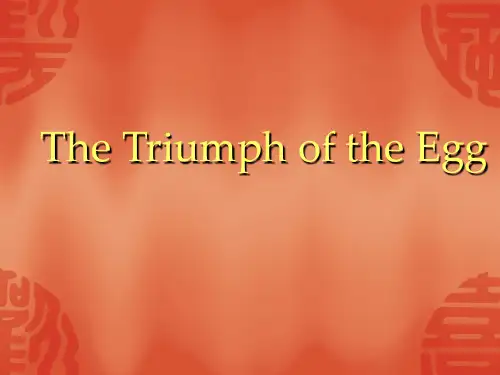
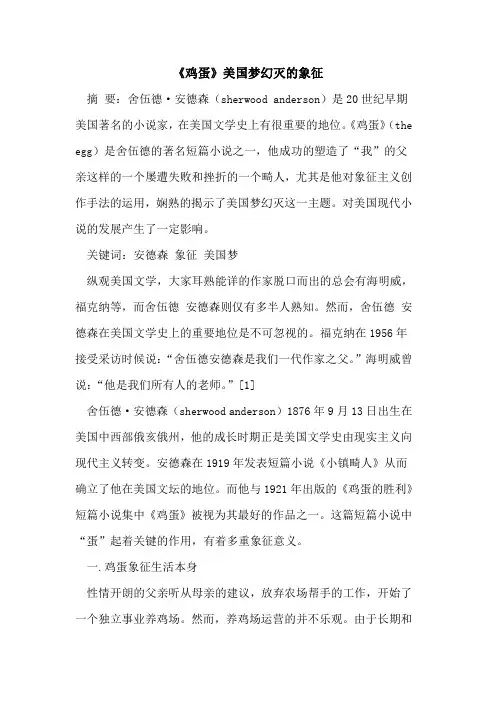
《鸡蛋》美国梦幻灭的象征摘要:舍伍德·安德森(sherwood anderson)是20世纪早期美国著名的小说家,在美国文学史上有很重要的地位。
《鸡蛋》(the egg)是舍伍德的著名短篇小说之一,他成功的塑造了“我”的父亲这样的一个屡遭失败和挫折的一个畸人,尤其是他对象征主义创作手法的运用,娴熟的揭示了美国梦幻灭这一主题。
对美国现代小说的发展产生了一定影响。
关键词:安德森象征美国梦纵观美国文学,大家耳熟能详的作家脱口而出的总会有海明威,福克纳等,而舍伍德安德森则仅有多半人熟知。
然而,舍伍德安德森在美国文学史上的重要地位是不可忽视的。
福克纳在1956年接受采访时候说:“舍伍德安德森是我们一代作家之父。
”海明威曾说:“他是我们所有人的老师。
”[1]舍伍德·安德森(sherwood anderson)1876年9月13日出生在美国中西部俄亥俄州,他的成长时期正是美国文学史由现实主义向现代主义转变。
安德森在1919年发表短篇小说《小镇畸人》从而确立了他在美国文坛的地位。
而他与1921年出版的《鸡蛋的胜利》短篇小说集中《鸡蛋》被视为其最好的作品之一。
这篇短篇小说中“蛋”起着关键的作用,有着多重象征意义。
一.鸡蛋象征生活本身性情开朗的父亲听从母亲的建议,放弃农场帮手的工作,开始了一个独立事业养鸡场。
然而,养鸡场运营的并不乐观。
由于长期和母亲以及小鸡打交道,父亲饱受挫折,从一个天性乐观的人变成一个沉默寡言的人。
第一次创业失败后,父亲开餐馆,但却无人问津。
在试图用鸡蛋娱乐客人失败之后,父亲变得这么绝望,以致他在冲动之下打算毁掉所有的鸡蛋。
这就像一个人失败的时候,容易倾向于毁掉导致他失败的所有东西。
但当他来到母亲面前,他身上发生了一些变化。
在母亲的劝诱下,他说出楼下发生的事情。
然后,他把鸡蛋轻轻放在桌子上,在母亲身边哭得像个孩子。
是的,他很想毁掉所有的鸡蛋,他不想再和它们打交道,他不想再在这个世界上痛苦地活着。

英美小说要素解析指导老师:2013.1.1An analysis of “The Egg”"The Egg", taken from "The Triumph of the Egg", one of Sherwood Anderson's well-known short stories, is a humorous fiction about a farmer who became infected with the American passion for "success" and started to pursue wealth and social position.However, he failed though he made several attempt. This paper tries to analyze the use of the egg as a symbol, the point of view and theme.“The egg ”which used throughout the story symbols three different things. First,“the egg” symbols th e American dream of the father. This story is from Sherwood Anderson's "The Triumph of the Egg", which was published in 1920s when America was experiencing a whole nation transformation from agricultural country into industrial country . At that time, almost the entire nation started the dream of gold rush, pursuing fortune. This man who encouraged by his wife after marrying a country schoolteacher got ambitious. After that, he started his journey of American dream. His first venture of chicken raising turned out badly. Although father made his great effort, chickens became sick and died, which meant the disillusionment of his dream. Second, various monstrous chickens symbols fathers’twisted psychological. Father preserved those grotesques in alchohol and place bottles that chickens was put in on a shelfback of the counter. This behavior indicated that father’ American dream became twisted. Third, the egg symbols cruel reality. Chickens come out of eggs, but they probably born malformed and they can get sick. This equals people who run into obstacles, like the father made his attempt but still could not survive misfortune.The point of view of this artical is the narrrator--the son. It is inevitable that a child’s descpription must be more than the fact.As the narrator wrote:“For some explainable reason I know the story as well as though I had been a witness to my father’s discomfiture.”The narrator did not witness what happened actually, he imaged the part he did not know. This also made the story more real like someonewas telling you about his family story face to face. Furthermore, this point of view began shift at this point for the purpose of flexibly showing different thoughts of father and Joe kane to strenthen the effect of this funny, tragic and hopeless story. What’s more,the humor of narrator brings people a feeling of relax. “I,however, digress”,“I exaggerated a little”, these words shorten the distance between the writer and the reader and give readers more space to think themselves. Besides, this helps figure the son character. Furthermore, narrator’s rhythm of the description controls the structure of story. The narrator uses few words to picture his fathers’ first thirty years. While he uses a number of words to picture the night--the climax.Catabolization is a common theme in modern literature.Because of the coming of industrial age, people can not adjust to the great change from agricultural age, which resulted in catabolization of people.This is exactly what sherwood wanted to show through “The egg”. D riven by American dream, the father made his every attempt. However, various difficulties discouraged his determination and confidence. And gradually, the father became psychologically twist, which is what I mentioned above—catabolization. The pursuit for money is not the best choice, it is the combination of mental and physical aspects that contributes to the real success. In addition, the deceit and falsity of American dream is the other theme of this artical. Chicken eats quantities of corn and meal bou ght by the sweat of the father’s brow but gets diseases; restaurant business gets no great success though the couple work hard; father can not achieve customers’ recognition through his performance. This failure of his performance means his failure of American dream, breaking his hope and illusions. All these disclose that it is difficult to get rid of poverty and low status through hard work in the money-mad metropolis.Sherwood Anderson tells people the value of life and the essence of things through this story. It reveals social crisis that people are meeting with. The author also shows his sympathy for them and his sadness for people who only pursuit money while ignore the rich of mental. The abundant symbolic meanings and unique point of view in the story make it among the classics of American short fiction. It deserves readers deep thought and research.。
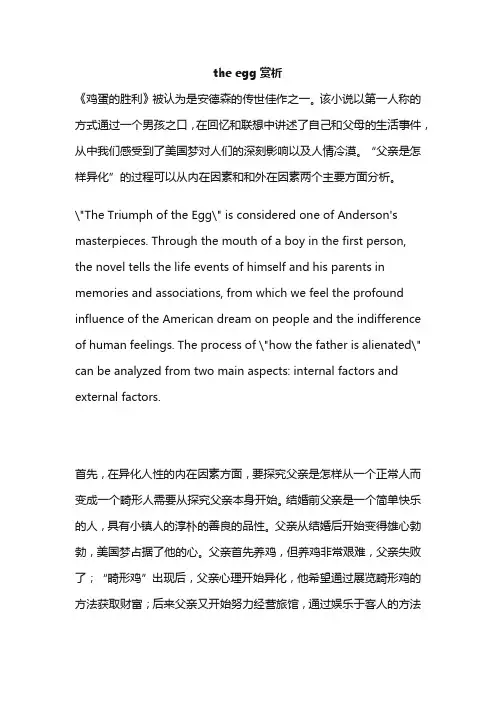
the egg赏析《鸡蛋的胜利》被认为是安德森的传世佳作之一。
该小说以第一人称的方式通过一个男孩之口,在回忆和联想中讲述了自己和父母的生活事件,从中我们感受到了美国梦对人们的深刻影响以及人情冷漠。
“父亲是怎样异化”的过程可以从内在因素和和外在因素两个主要方面分析。
\"The Triumph of the Egg\" is considered one of Anderson's masterpieces. Through the mouth of a boy in the first person, the novel tells the life events of himself and his parents in memories and associations, from which we feel the profound influence of the American dream on people and the indifference of human feelings. The process of \"how the father is alienated\" can be analyzed from two main aspects: internal factors and external factors.首先,在异化人性的内在因素方面,要探究父亲是怎样从一个正常人而变成一个畸形人需要从探究父亲本身开始。
结婚前父亲是一个简单快乐的人,具有小镇人的淳朴的善良的品性。
父亲从结婚后开始变得雄心勃勃,美国梦占据了他的心。
父亲首先养鸡,但养鸡非常艰难,父亲失败了;“畸形鸡”出现后,父亲心理开始异化,他希望通过展览畸形鸡的方法获取财富;后来父亲又开始努力经营旅馆,通过娱乐于客人的方法而使生意好转:但是最终他失败了。
从一次次的失败可以看出父亲随着鸡的畸形自己也开始变得异化。
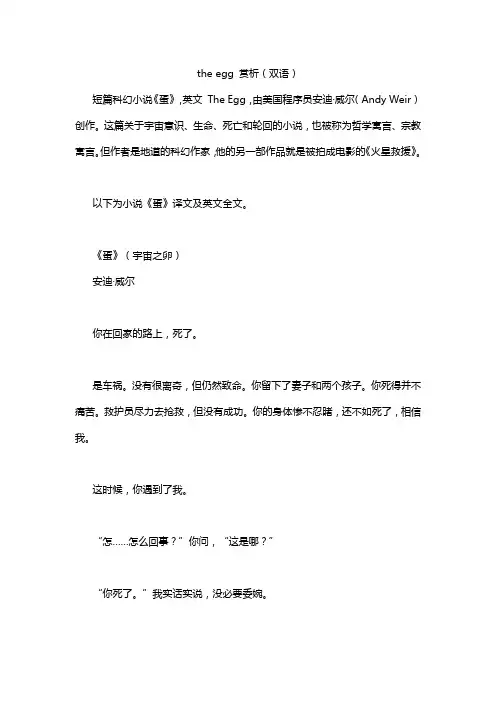
the egg 赏析(双语)短篇科幻小说《蛋》,英文The Egg,由美国程序员安迪·威尔(Andy Weir)创作。
这篇关于宇宙意识、生命、死亡和轮回的小说,也被称为哲学寓言、宗教寓言。
但作者是地道的科幻作家,他的另一部作品就是被拍成电影的《火星救援》。
以下为小说《蛋》译文及英文全文。
《蛋》(宇宙之卵)安迪·威尔你在回家的路上,死了。
是车祸。
没有很离奇,但仍然致命。
你留下了妻子和两个孩子。
你死得并不痛苦。
救护员尽力去抢救,但没有成功。
你的身体惨不忍睹,还不如死了,相信我。
这时候,你遇到了我。
“怎……怎么回事?”你问,“这是哪?”“你死了。
”我实话实说,没必要委婉。
“一辆……一辆卡车,它失控了……”“没错。
”我说。
“我……我死了?”“是的。
但别难过,每个人都会死。
”我说。
你环顾四周,一片虚空,只有你和我。
“这是什么地方?”你问,“死后的世界?”“可以这么说吧。
”我说。
“你是上帝?”你问。
“对,”我回答,“我是上帝。
”“我的孩子们……还有我太太……”你说。
“怎么了?”“他们没事吧?”“这一点我喜欢,”我说,“你死了,还关心你的家人,在这里这是好事。
”你困惑地看着我。
对你而言,我看起来并不像神,更像一个普通男人,亦或一个女人。
一个模糊又权威的形象。
也许,比起万能的神,我更像是一位老师。
“别担心,”我说,“他们都会好起来的。
你在孩子们的记忆中会是完美的,他们还没成长到叛逆你的年龄。
你太太会在人前恸哭,但其实内心里却如释重负。
平心而论,你们的婚姻早已破裂了。
她会对自己松一口气的心情感到内疚,对你来说,这或许算是一点安慰。
”“哦,”你说,“那么,现在呢?我是上天堂还是下地狱,或者去别的什么地方?”“都不是,”我说,“你会重新投胎。
”“啊,”你说,“原来轮回转世是真的?”“所有宗教都以不同的方式合理着,”我说,“跟我走吧。
”你跟着我,在虚空中穿行,“我们去哪里?”“不去哪里,”我说,“边走边聊就好。
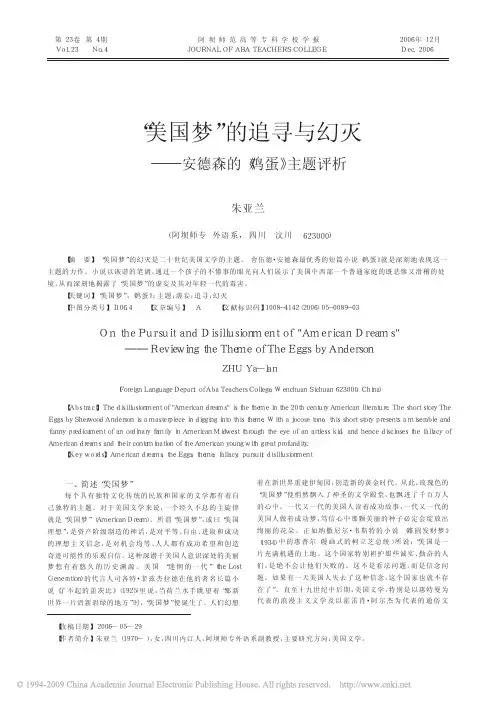
一、简述“美国梦”每个具有独特文化传统的民族和国家的文学都有着自己独特的主题。
对于美国文学来说,一个经久不息的主旋律就是“美国梦”(AmericanDream)。
所谓“美国梦”,或曰“美国理想”,是资产阶级制造的神话,是对平等、自由、进取和成功的理想主义信念,是对机会均等、人人都有成功希望和创造奇迹可能性的乐观自信。
这种深潜于美国人意识深处的美丽梦想有着悠久的历史渊源。
美国“迷惘的一代”(theLostGeneration)的代言人司各特・菲兹杰拉德在他的著名长篇小说《了不起的盖茨比》(1925)里说,当荷兰水手眺望着“那新世界一片清新碧绿的地方”时,“美国梦”便诞生了。
人们幻想着在新世界重建伊甸园,创造新的黄金时代。
从此,玫瑰色的“美国梦”便悄然飘入了神圣的文学殿堂,也飘进了千百万人的心中。
一代又一代的美国人读着成功故事,一代又一代的美国人做着成功梦,笃信心中那颗美丽的种子必定会绽放出绚丽的花朵。
正如纳撒尼尔・韦斯特的小说《难圆发财梦》(1934)中的惠普尔(漫画式的柯立芝总统)所说:“美国是一片充满机遇的土地。
这个国家特别袒护那些诚实、勤奋的人们,是绝不会让他们失败的。
这不是看法问题,而是信念问题。
如果有一天美国人失去了这种信念,这个国家也就不存在了”。
直至十九世纪中后期,美国文学,特别是以惠特曼为代表的浪漫主义文学及以霍雷肖・阿尔杰为代表的通俗文“美国梦”的追寻与幻灭———安德森的《鸡蛋》主题评析朱亚兰(阿坝师专外语系,四川汶川623000)【摘要】“美国梦”的幻灭是二十世纪美国文学的主题。
舍伍德・安德森最优秀的短篇小说《鸡蛋》就是深刻地表现这一主题的力作。
小说以诙谐的笔调,通过一个孩子的不懂事的眼光向人们展示了美国中西部一个普通家庭的既悲惨又滑稽的处境,从而深刻地揭露了“美国梦”的虚妄及其对年轻一代的毒害。
【关键词】“美国梦”;《鸡蛋》;主题;虚妄;追寻;幻灭【中图分类号】I106.4【文章编号】A【文献标识码】1008-4142(2006)05-0089-03OnthePursuitandDisillusionmentof"AmericanDreams"———ReviewingtheThemeofTheEggsbyAndersonZHUYa-lan(ForeignLanguageDepart.ofAbaTeachersCollege,WenchuanSichuan623000,China)【Abstract】Thedisillusionmentof"Americandreams"isthethemeinthe20thcenturyAmericanliterature.TheshortstoryTheEggsbySherwoodAndersonisamasterpieceindiggingintothistheme.Withajocosetone,thisshortstorypresentsamiserableandfunnypredicamentofanordinaryfamilyinAmericanMidwestthroughtheeyeofanartlesskid,andhencedisclosesthefallacyofAmericandreamsandtheircontaminationoftheAmericanyoungwithgreatprofundity.【Keywords】Americandreams;theEggs;theme;fallacy;pursuit;disillusionment【收稿日期】2006—05—29【作者简介】朱亚兰(1970-),女,四川内江人,阿坝师专外语系副教授,主要研究方向:美国文学。
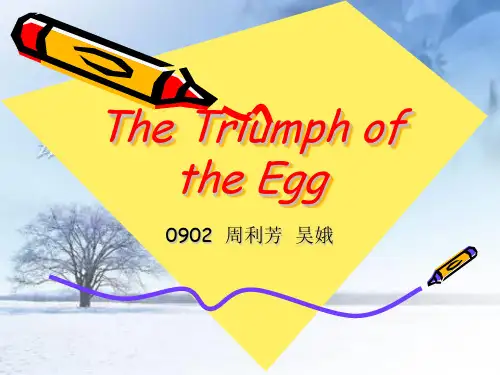
第12单元舍伍德·安德森12.1复习笔记I.Introduction to author(作者简介)1.Life(生平)Sherwood Anderson(1876-1941),a novelist,was born in Camden,Ohio,the third of seven children of his family.After his father’s business failed,the family was forced to move frequently,finally settling down at Clyde,Ohio,in1884.Partly as a result of these misfortunes,young Sherwood found various odd jobs to help his family,which earned him the nickname"Jobby."He left school at age14.Anderson moved to Chicago near his brother’s home and worked as a manual laborer until near the turn of the century,when he enlisted in the United States Army.He was called up but did not see action in Cuba during the Spanish-American War.After the war,in1900,he enrolled at Wittenberg University in Springfield,Ohio. Eventually he secured a job as a copywriter in Chicago and became more successful.舍伍德·安德森(1876—1941)是一位小说家,出身于俄亥俄州卡姆丹镇,在七个孩子中排行第三。
美国文学毕业论文选题:1.从《最后的莫西干人》看殖民者对印第安人的压迫The Oppression of the Indians by the Colonists in The Last of the Mohicans2.浅析《智血》中的女性哥特色彩On Female Gothic Flavor of Wise Blood3.论《竞选州长》的写作技巧The Writing Skills of Running for Governor4.浅析《心是孤独的猎手》的孤独主题The Theme of Loneliness in The Heart Is a Lonely Hunter5.论《奥吉∙马奇历险记》的反传统风格On the Unconventional Style of The Adventures of Augie March6.浅析《螺丝在拧紧》中的哥特成分An Analysis of the Gothic Elements in The Turn of the Screw7.季诺碧亚和普里西拉的原型分析Archetypes of Zenobia and Priscilla8.《推销员之死》中的“美国梦”分析American Dreams in Death of a Salesman9.论《榆树下的欲望》中《圣经》场景的投影和颠覆A Projection and Overturn of Biblical Scene in Desire Under the Elms10.浅析《夜访吸血鬼》中的吸血鬼形象Analysis of the Vampire in Interview with the Vampire11.《冷山》的主题思想分析The Themes of Cold Mountain12.浅析《野性的呼唤》中个人英雄主义On the Individualism of The Call of the Wild13.两个关于幽灵的故事——对《厄舍古屋的倒塌》和《蝴蝶梦》的比较研究Two Stories Of Specter:The Contrast Analysis of the Fall of the House of Ursher and Rebecca14.霍尔顿悲剧成因分析Analysis on the Causes of Holden’s Tragedy15.浅析《野性的呼唤》中的自然主义The Brief Analysis of Naturalism in The Call of the Wild16.从《老人与海》看海明威作品中的硬汉形象—桑提亚哥On the Image of a Tough Guy in The Old Man and the Sea—Santiago17.试析《S.》中厄普代克对女权运动的态度On Updike’s Attitude towards Feminism in S.18.《飘》中女主角斯嘉丽的性格分析An Analysis of the Characters of Scarlett in Gone with the wind19.从变态心理学的视角分析电影《沉默的羔羊》An Analysis of the Silence of the Lambs—From the Perspective of Abnormal Psychology 20.《紫颜色》中艾伯特人物分析An Character Analysis of Albert in The Color Purpl21.浅析弗罗斯特的诗歌特色On the Features of Robert Frost’s Poetry22.论海明威作品《太阳照样升起》中的女性形象On the Images of Women in Hemingway`s The Sun Also Rises23.美国自然文学在斯蒂芬•克莱恩的作品中体现American Naturalism Reflected in Stephen Crane’s Works24.浅谈海明威的作品《太阳照常升起》中“迷惘的一代”‘The Lost Generation’ in Hemingway’s The Sun Also Rises25.《小妇人》中四姐妹的人物塑造On the Characterization of the Four Sisters in Little Woman26.美国黑人文化身份的困境:评托妮•莫里森的《柏油娃》The Dilemma of Black American Cultural Identity: on Toni Morrison’s Tar Boy27.《看不见的人》的爵士乐风格Jazz Style in Invisible Man28.论《一个干净明亮的地方》的写作技巧On the Techniques of A Clean,Well-Lighted Place29.托妮•莫里森笔下的微笑意象The Smile Image in Toni Morison’s Writing30.成长的艰辛—《麦田里的守望者》的主题分析Difficulties in Growing Up: A Thematic Analysis of The Catcher in the Rye31.《小镇畸人》中的怪人形象The Image of Grotesques in Winesburg, Ohio32.《赫索格》的艺术表现手法Techniques of Artistic Expression in Herzog33.浅谈纳博科夫的《洛丽塔》中的病态心理On Insanity in Lolita by Nabokov34.《汤姆叔叔的小屋》中女性意识力量The Female Consciousness in Uncle Tom's Cabin35.论《愤怒的葡萄》中体现的《圣经》元素On the Elements of the Bible in the Grapes of Wrath36.书信体叙述模式在《紫色》中的运用The Epistolary Narration in The Color Purple37.托尼莫里森作品中人物名字的意义The Meaning of Names in Toni Morisson's Novels38.论小说《在路上》中垮掉的一代A Survey on the Beat Generation from On the Road39.论《永别了,武器》中的悲剧策略Analysis on the Tragic Strategy of A Farewell to Arms The Tragic Spirit in Death of a Salesman40.孤独与失落的守望—析《麦田里的守望者》Waiting in Perplexity and Degradation ——Analysis of The Catcher in The Rye41.论海明威《一个干净明亮的地方》中的虚无主义The Analysis on Nihilism in Hemingway’s Short Story A Clean, Well-lighted Place42.试析《哈克贝利•费恩历险记》中的人性刻画On the Humanity Reflected in The Adventures of Huckleberry Finn43.唐人街文化分析——以水仙花与朱路易作品为例Analysis of Chinatown Culture—Taking the Works of Sui Sin Far and Louis Chu as the Example44.意象派诗歌中东方审美因素的分析On the Analysis of Oriental Aesthetic Elements in the Imagist Poetry45.《这个杀手不太冷》的主人公性格分析Character Analysis of “LEON”46.论马丁•伊登和杰伊•盖茨比的比较研究A Comparative Study between Martin Eden and Jay Gatesby47.浅析《鸡蛋的胜利》中运用象征手法表现美国梦On the American Dream Expressed by Symbolism by The Triumph of the Egg48.从《教父》看两代人不同的家庭观The Discrepancy of Family Values between Two Generations in The Godfather49.《推销员之死》中的矛盾与冲突Conflict and Contradiction— On Death of a Salesman50.论霍桑作品中的象征手法----以《年轻人古德曼•布朗》为例On the Symbolism in Hawthorne's Works---taking Young Goodman Brown as a example 51.浅谈《厄舍古屋的倒塌》的叙事视角On the Narrative Point of View in The Fall of the House of Usher52.论《厄舍古屋倒塌》中的哥特元素On Gothic Elements in “The Fall of the House of Usher”53.解析《第二十二条军规》中的黑色幽默On the Black Humor in Catch-2254.论《所罗门之歌》的主题55.论《推销员之死》的悲剧观56.从休斯到莫里森浅析美国黑人文学的嬗变57.浅析爱伦•坡的侦探小说58.浅析《汤姆叔叔的小屋》主人公性格59.《嚎叫》——垮掉的一代的预言60.从愤怒的葡萄中看美国大萧条61.杰克伦敦的自然主义——通过作品《野性的呼唤》和《白牙》分析其自然主义倾向62.《哈克贝利•费恩历险记》的写作特点分析63.《愤怒的葡萄》中《圣经》的象征意义64.海勒斯与卡米拉的爱情对比分析65.浅析王熙凤与斯嘉丽的异同66.从生态女权主义角度来解读托妮•莫里森的《宠儿》67.《最蓝的眼睛》中非裔美国人的自我憎恨68.“心之罪”与“魂之恶”——比较研究《红字》与《厄榭尔府的倒塌》69.杰克•伦敦的《野性的呼唤》中的自然主义元素70.论简爱中的女性意识71.汤姆.索亚,哈克.贝丽芬和马克吐温的时代观72.海明威的女性意识73.论嘉莉妹妹成功的原因74.从《喧哗与骚动》中凯莉的悲剧看女性的社会地位75.透视《宠儿》中美国黑人女性的悲剧与成长76.浅析《心是孤独的猎手》中人物异化的生存状态77.论小男孩在《老人与海》中的作用78.浅析《论自助》中人生自主的源泉79.浅析马克•吐温小说的地方色彩主义特点On the Characteristics of Dickinson’s Poems80.哈克贝利•费恩的性格分析An Analysis of the Characteristics of Huckleberry Finn81.浅析《欲望号街车》的主题An Analysis of the Theme of A Streetcar Named Desire82.狄金森诗歌的特点之浅析On the Characteristics of Dickinson’s Poems83.浅析狄金森诗歌中的死亡主题On the Death Theme of Dickinson’s Poems84.从凯蒂的悲剧中看20世纪初女性的社会地位From Caddy’s Tragedy to View Women’s Social Status in the Early 20th Century 85.《乱世佳人》对21世纪女性的启示An Analysis of the Inspiration of Gone with the Wind to the 21st Century Women 86.解读《献给艾米丽的一朵玫瑰》中的悲剧元素On Tragic Elements in A Rose for Emily87.浅析《麦田里的守望者》中霍顿的性格特点An Analysis of Holden’s Characteristics in The Catcher in the Rye88.斯嘉丽:“旧”时代的“新”女性Scarlett O’Hara, A “New” Woman In “Old” Period89.“无形”困境——对《看不见的人》的主题分析“Invisible Plight” ---- An Analysis of the theme of Invisible Man90.情感与理智——浅析《飘》中的婚姻观Emotion and Intellect---- An Analysis of View of Marriage in Gone with the Wind 91.浅析《欲望号街车》中布兰奇的悲剧根源On the Origin of Blanche’s Tragedy in A Streetcar Named Desire92.论对《哈克贝利•费恩历险记》的种族主义误读On Racist Misperception of The Adventures of Huckleberry Finn93.从《喜福会》透视中美文化冲突与融合On the Cultural Conflicts and Blending Embodied in The Joy Luck Club94.浅析惠特曼的写作技巧A Brief Analysis of the Writing Techniques of Whitman95.对《宠儿》中叙事方法的分析An Analysis of the Narrative Tactics in Beloved96.浅析《赫索格》中的犹太情结A Brief Analysis of the Jewish Complex in Herzog97.抗争与守望:论《小镇畸人》中的畸形人物Struggle and Watch: A Study of the Grotesques in Winesburg, Ohio98.浅析《嘉莉妹妹》中的自然主义特征A Brief Analysis of Naturalistic Features in Sister Carrie99.浅析《看不见的人》中黑人的被漠视境遇An Analysis of Blacks’ Invisible Situation in Invisible Man100.浅析欧•亨利短篇小说的结尾艺术与人文关怀A Brief Analysis of the Twist Ending and the Humanity Cares in O. Henry’s Short Stories 101.浅析《看不见的人》中的布鲁斯神韵An Analysis on the Spirit of the Blues in Invisible Man102.哈克贝利•费恩的性格分析An Analysis of the Characteristics of Huckleberry Finn103.伊迪斯•华顿《纯真年代》中的女性意识Feminine Consciousness in Edith Wharton’s The Age of Innocence104.《嘉莉妹妹》中的早期自然主义Dreiser’s Early Naturalism in Sister Carrie105.论《夜色温柔》中美国梦的破灭On the Collapse of American Dream in Tender is the Night106.艾米莉•狄更森诗歌之主题研究On the Themes of Emily Dickinson’s Poems107.对《推销员之死》对话的语用分析A Pragmatic Analysis of the Dialogues in Death of a Salesman108.《红字》中的象征意义The Symbolism in The Scarlet Letter109.浅析《美国悲剧》中罗贝塔的悲剧性On the Tragedy of Roberta in An American Tragedy110.论《洛丽塔》中的彼岸世界On the “Otherworld” of Lolita111.通过《飘》看女人的觉醒Gone with the Wind and the Awakening of Women112.浅析托尼•莫里森《宠儿》中的魔幻现实主义的应用Magic Realism in Tony Morrison’s Beloved113.《看不见的人》中的社会问题分析Analysis of Social Problems in Invisible Man114.论《秀拉》中女性的自我寻找Self-realization of the Females in Sula115.浅析《了不起的盖茨比》比中颜色的象征意义The Symbolic Meaning of Color Words in The Great Gatsby116.从《嘉莉妹妹》看女性价值观变迁Changes of Female’s Values in Sister Carrie117.浅析多斯• 帕索斯在“美国”三部曲中的写作手法Techniques Employed in U.S.A by John Dos Passos118.爱伦•坡小说中的恐怖因素Horror Elements in Edgar Allen Poe’s Fiction119.浅析《我有一个梦想》的修辞手法与主题表现An Analysis of Rhetoric Method and Theme of I Have a Dream120.浅析《芒果街上的小屋》中的女性形象Analysis on the Female Images in The House on Mango Street121.浅析欧•亨利的黑色幽默On O. Henry’s Black Humor122.欧•亨利短篇小说中的反衬艺术The Art of Making Contrasts in O• Henry's Short Stories123.论《了不起的盖茨比》中的美国梦On the American Dream in The Great Gatsby124.圣经对美国小说的影响The Influence of Bible in American Novel125.《白鲸》的生态解读Ecological Analysis of Moby-Dick126.论《汤姆•索亚历险记》的魅力所在The Charms of the Adventures of Tom Sawyer127.《老人与海》的象征主义Symbolism in The Old Man and the Sea128.《汤姆叔叔的小屋》主要人物性格分析Analysis of the Protagonists’ Character in Uncle Tom’s Cabin129.基督教在《汤姆叔叔的小屋》中的体现Christianity in Uncle Tom's Cabin130.论T.S.艾略特《荒原》中的宗教思想A Discussion of the Religious Ideas in The Waste Land of T. S. Eliot131.论《推销员之死》的悲剧精神The Tragic Spirit in Death of a Salesman132.《秘密花园》现代主义主题分析On the Modernist Themes in The Secret Garden133.简析艾伦•金斯堡《嚎叫》中的“垮掉的一代”Brief Analysis of the Beat Generation in Allen Ginsberg’s Howl134.“嘉莉妹妹”—西方女性的缩影Sister Carrie—the Miniature of Western Women135.伊迪丝•华顿的《纯真年代》中的女性意识Feminine Consciousness in Edith Wharton’s The Age of Innocence136.解析《红字》中A的象征意义On the Symbolic Meaning of A in The Scarlet Letter137.《小妇人》—一曲新女性的赞歌Little Women, a Celebration of New Women138.梭罗的《瓦尔登湖》中蕴含的深层生态学思想Deep Ecological Thoughts Contained in Thoreau’s Walden139.从《喧哗与骚动》中浅析20世纪初女性的社会地位Analysis of Women’s Social Position in Early 20th Century from The Sound and the Fury 140.浅析海明威的《一个干净明亮的地方》A Brief Discussion of Hemingway’s A Clean and Well-lighted Place141.论《美国悲剧》中萝贝塔的悲剧性The Tragedy of Roberta in American Tragedy142.马克•吐温短篇小说的幽默与讽刺Humor and Irony in Mark Twain’s Short Story143.论马克•吐温小说的讽刺144.浅析马克吐温的《败坏了哈得莱堡的人》中的讽刺艺术145.论《觉醒》的主题和特点146.透过《嘉莉妹妹》看世纪之交的美国消费文化147.从女性主义视角解读《紫色》148.论《麦田里的守望者》中读者对艺术真实的认同与重建149.《宠儿》中黑人女性的社会地位150.浅析艾米莉•狄金森的爱情诗151.《白鲸》所反映出的生活态度152.浅析《嘉莉妹妹》中的新女性形象153.论《土生子》中的种族主义154.《喜福会》中母爱主题的阐释155.从庞德的作品品读意象派风格156.从超验主义重新解读《小妇人》157.评莫里森《最蓝的眼睛》的艺术特色158.论《老人与海》的悲剧色彩159.小男孩在《老人与海》中的作用160.浅谈尼采思想对杰克•伦敦及其小说《马丁• 伊登》的影响161.论《白象似的群山》中海明威独特的写作风格162.对海明威短篇小说艺术特色的研究163.从《嘉莉妹妹》看美国梦的幻灭。
The Triumph of the Egg - 蛋的胜利Note: 以下是关于《The Triumph of the Egg》这部小说的一些关键概念和分析。
本文将介绍作者伊登·华莱士的文学风格、主题和情节。
通过文中的人物描写和故事情节,这部小说探索了生活的不确定性以及人性中的善恶和追求。
本文将以思考者,最终找到自己命运的人图像来阐明伊登·华莱士的小说《The Triumph of the Egg》。
在这部小说中,华莱士通过对于这个角色和他周围环境的描写,将我们带进一个充满希望和挑战的世界。
小说透过普通人的日常生活,探讨了人性的复杂性和奋斗的意义。
反映社会底层生活伊登·华莱士以他独特的描写方式,将美国中西部农村地区的社会底层生活展现出来。
小说中的人物都是普通家庭的一员,他们生活在稳定但平凡的环境中。
华莱士描绘了每个角色的个性和思想,使读者能够更好地了解角色内心的动机和挣扎。
通过这种细腻的描写,伊登·华莱士创造了一个真实而引人入胜的世界。
人性的复杂性与追求《The Triumph of the Egg》深入探讨了人性的复杂性和追求。
小说中的角色们都在努力寻找生活的意义,追求他们认为是成功和幸福的方式。
然而,他们发现道路并不总是那么平坦,很多时候他们必须面对挫折和困难。
这种描写使读者能够对这些角色产生共鸣,因为每个人都在不同程度上经历过这种追求和挣扎。
命运和个人选择小说中的主角们常常受到命运的束缚,但他们也能够通过自己的个人选择来改变自己的命运。
他们的决定有时是勇敢的,有时是无奈的,但他们勇敢地面对命运的挑战。
这种探索揭示了命运和个人选择之间的微妙关系,以及如何通过决策来改变一个人的生活轨迹。
希望和挫折的历程在《The Triumph of the Egg》中,希望和挫折是贯穿整个故事的主题。
角色们经历着希望和挫折的起伏,有时候他们克服了挫折,继续追寻他们的梦想。
一、简介舍伍德·安德森(1876-1941) 被誉为20 世纪最伟大的美国作家之一,也是现代美国文学的先驱。
出生在美国俄亥俄州的一个小镇,经历了二十世纪初美国从农业社会向工业社会的快速转型,关注商业经济冲击下的小镇生活和人们的精神异化。
他的代表作有《俄亥俄州温斯堡》(1919)、《可怜的怀特》(1920)和《黑暗的笑声》(1925)。
他的作品尽管情节简单零散,结构松散,却有着深刻的意义。
他的故事因使用黑色幽默和微妙的符号而令人印象深刻[ 1](第81 页)。
“鸡蛋”收录在他于1921 年出版的短篇小说选集《鸡蛋的胜利》中。
这个故事集包括14 个独立的故事,共同揭示了20 世纪初人们不得不放弃传统生活方式的社会现实由于工业化浪潮带来的剧变,对物质富裕的向往;因此,许多人在追求物质成功的过程中被疏远了。
这些故事揭示了美国人民不择手段的狂热追求财富的腐败和空虚,对那些不适应社会剧变的受害者表示同情。
因此,人们对20世纪初美国社会大力倡导的美国梦提出质疑和批评。
《鸡蛋》是舍伍德·安德森关于早期工业化浪潮的著名作品之一,经常被选入文学选集。
故事背景是二十世纪头十年左右,在工业化冲击下的美国小镇,新兴的商业社会正在侵蚀人们的传统生活和价值观。
“The Egg”由一个孩子以第一人称讲述他父亲失败的商业冒险。
他的父亲过去过着自给自足的幸福农村生活。
在新时代的冲击下,在妻子的催促下,婚后要“扬帆起航”,父亲放弃了原本简单幸福的生活,追寻成功的梦想,但最终以悲惨收场。
他的父亲首先安排了一场家禽活动,结果很糟糕。
破产后,他的父亲开了一家餐馆,但利润惨淡。
经历了一系列的商业失败,他的父亲最终对他为取悦顾客而做出的荒谬表演感到沮丧。
事实证明,他是愚蠢节目中的蔑视对象。
下面将分析安德森如何用鸡蛋的比喻来揭示虚幻的美国梦。
美国梦被讽刺为通过父亲的悲剧本质上的拜金主义。
他的悲剧表明人们是如何疏远他们腐败的唯物主义成功梦想的。
"The Triumph of the Egg"Sherwood Anderson1920My father was, I am sure, intended by nature to be a cheerful, kindly man. Until he was thirty-four years old he worked as a farmhand for a man named Thomas Butterworth whose place lay near the town of Bidwell, Ohio. He had then a horse of his own, and on Saturday evenings drove into town to spend a few hours in social intercourse with other farmhands. In town he drank several glasses of beer and stood about in Ben Head's saloon-crowded on Saturday evenings with visiting farmhands. Songs were sung and glasses thumped on the bar. At ten o'clock father drove home along a lonely country road, made his horse comfortable for the night, and himself went to bed, quite happy in his position in life. He had at that time no notion of trying to rise in the world.It was in the spring of his thirty-fifth year that father married my mother, then a country schoolteacher, and in the following spring I came wriggling and crying into the world. Something happened to the two people. They became ambitious. The American passion for getting up in the world took possession of them.It may have been that mother was responsible. Being a schoolteacher she had no doubt read books and magazines. She had, I presume, read of how Garfield, Fin coin, and other Americans rose from poverty to fame and greatness, and as I lay beside her-in the days of her lying-in-she may have dreamed that I would Someday rule men and cities. At any rate she induced father to give up his place as a farmhand, sell his horse, and embark on an independent enterprise of his own. She was a tall silent woman with a long nose and troubled gray eyes. For herself she wanted nothing. For father and myself she was incurably ambitious.The first venture into which the two people went turned out badly. They rented ten acres of poor stony land on Grigg's Road, eight miles from Bidwell, and launched into chicken-raising. I grew into boyhood on the place and got my first impressions of life there. From the beginning they were impressions of disaster, and if, in my turn, I am a gloomy man inclined to see the darker side of life, I attribute it to the fact that what should have been for me the happy joyous days of childhood were spent on a chicken farm.One unversed in such matters can have no notion of the many and tragic things that can happen to a chicken. It is born out of an egg, lives for a few weeks as a tiny fluffy thing such as you will see pictured on Easter cards, then becomes hideously naked, eats quantities of corn and meal bought by the sweat of your father's brow, gets diseases called pip, cholera, and other names, stands looking with stupid eyes at the sun, becomes sick and dies. A few hens and now and then a rooster, in' tended to serve God's mysterious ends, struggle through to maturity. The hens lay eggs out of which come other chickens and the dreadful cycle is thus made complete. It is all unbelievably complex. Most philosophers must have been raised on chicken farms. One hopes for so much from a chicken and is so dreadfully disillusioned. Small chickens, just setting out on the journey of life, look so bright and alert and they are in fact so dreadfully stupid. They are so much like people theymix one up in one's judgments of life. If disease does not kill them, they wait until your expectations are thoroughly aroused and then walk under the wheels of a wagon-to go squashed and dead back to their maker. Vermin infest their youth, and fortunes must be spent for curative powders. In later life I have seen how a literature has been built up on the subject of fortunes to be made out of the raising of chickens. It is intended to be read by the gods who have just eaten of the tree of the knowledge of good and evil. It is a hopeful literature and declares that much may be done by simple ambitious people who own a few hens. Do not be led astray by it. It was not written for you. Go hunt for gold on the frozen hills of Alaska, put your faith in the honesty of a politician, believe if you will that the world is daily growing better and that good will triumph over evil, but do not read and believe the literature that is written concerning the hen. It was not written for you.I, however, digress. My tale does not primarily concern itself with the hen. If correctly told it will center on the egg. For ten years my father and mother struggled to make our chicken farm pay and then they gave up their struggle and began another. They moved into the town of Bidwell, Ohio, and embarked in the restaurant business. After ten years of worry with incubators that did not hatch, and with tiny-and in their own way lovely-balls of fluff that passed on into semi-naked pullet hood and from that into dead henhood, we threw all aside and, packing our belongings on a wagon, drove down Grigg's Road toward Bidwell, a tiny caravan of hope looking for a new place from which to start on our upward journey through life.We must have been a sad-looking lot, not, I fancy, unlike refugees fleeing from a battlefield. Mother and I walked in the road. The wagon that contained our goods had been borrowed for the day from Mr. Albert Griggs, a neighbor. Out of its side stuck the legs of cheap chairs, and at the back of the pile of beds, tables, and boxes filled with kitchen utensils was a crate of live chickens, and on top of that the baby carriage in which I had been wheeled about in my infancy. Why we stuck to the baby carriage I don't know. It was unlikely other children would be born and the wheels were broken. People who have few possessions cling tightly to those they have. That is one of the facts that make life so discouraging.Father rode on top of the wagon. He was then a baldheaded man of forty-five, a little fat, and from long association with mother and the chickens he had become habitually silent and discouraged. All during our ten years on the chicken farm he had worked as a laborer on neighboring farms and most of the money he had earned had been spent on remedies to cure chicken diseases, on Wilmer's White Wonder Cholera Cure or Professor Bidlow's Egg Producer or some other preparations that mother found advertised in the poultry papers. There were two little patches of hair on father's head just above his ears. I remember that as a child I used to sit looking at him when he had gone to sleep in a chair before the stove; on Sunday afternoons in the winter. I had at that time already begun to read books and have notions of my own, and the bald path that led over the top of his head was, I fancied, something like a broad road, such a road as Caesar might have made on which to lead his legions out of Rome and into the wonders of an unknown world. The tufts of hair that grew above father's ears were, I thought, like forests. I fell into a half sleeping, halfwaking state and dreamed I was a tiny thing going along the road into a far beautiful place where there were no chicken farms and where life was a happy egg less affair.One might write a book concerning our flight from the chicken farm into town. Mother and I walked the entire eight miles-she to be sure that nothing fell from the wagon and I to see the wonders of the world. On the seat of the wagon beside father was his greatest treasure. I will tell you of that.On a chicken farm, where hundreds and even thousands of chickens come out of eggs, surprising things sometimes happen. Grotesques are born out of eggs as out of people. The accident does not often occur-perhaps once in a thousand births. A chicken is, you see, born that has four legs, two pairs of wings, two heads, or what not. The things do not live. They go quickly back to the hand of their maker that has for a moment trembled. The fact that the poor little things could not live was one of the tragedies of life to father. He had some sort of notion that if he could but bring into henhood or roosterhood a five-legged hen or a two-headed rooster his fortune would be made. He dreamed of taking the wonder about the county fairs and of growing rich by exhibiting it to other farmhands.At any rate, he saved all the little monstrous things that had been born on our chicken farm. They were preserved in alcohol and put each in its own glass bottle. These he had carefully put into a box, and on our journey into town it was car tied on the wagon seat beside him. He drove the horses with one hand and with the other clung to the box. When we got to our destination, the box was taken down at once and the bottles removed. All during our days as keepers of a restaurant in the town of Bidwell, Ohio, the grotesques in their little glass bottles sat on a shelf back of the counter. Mother sometimes protested, but father was a rock on the subject of his treasure. The grotesques were, he declared, valuable. People, he said, liked to look at strange and wonderful things.Did I say that we embarked in the restaurant business in the town of Bidwell, Ohio? I exaggerated a little. The town itself lay at the foot of a low hill and on the shore of a small river. The railroad did not run through the town and the station was a mile away to the north at a place called Pickleville. There had been a cider mill and pickle factory at the station, but before the time of our coming they had both gone out of business. In the morning and in the evening buses came down to the station along a road called Turner's Pike from the hotel on the main street of Bidwell. Our going to the out-of-the-way place to embark in the restaurant business was mother's idea. She talked of it for a year and then one day went off and rented an empty store building opposite the railroad station. It was her idea that the restaurant would be profitable. Traveling men, she said, would be always waiting around to take trains out of town and town people would come to the station to await incoming trains. They would come to the restaurant to buy pieces of pie and drink coffee. Now that I am older I know that she had another motive in going. She was ambitious for me. She wanted me to rise in the world, to get into a town school and become a man of the towns.At Pickleville father and mother worked hard, as they always had done. At first there was the necessity of putting our place into shape to be a restaurant. That took amonth. Father built a shelf on which he put tins of vegetables. He painted a sign on which he put his name in large red letters. Below his name was the sharp command —"EAT HERE"—that was so seldom obeyed. A showcase was bought and filled with cigars and tobacco. Mother scrubbed the floors and the walls of the room. I went to school in the town and was glad to be away from the farm, from the presence of the discouraged, sad-looking chickens. Still I was not very joyous. In the evening I walked home from school along Turner's Pike and remembered the children I had seen playing in the town school yard. A troop of little girls had gone hopping about and singing. I tried that. Down along the frozen road I went hopping solemnly on one leg. "Hippity Hop To The Barber Shop," I sang shrilly. Then I stopped and looked doubtfully about. I was afraid of being seen in my gay mood. It must have seemed to me that I was doing a thing that should not be done by one who, like myself, had been raised on a chicken farm where death was a daily visitor.Mother decided that our restaurant should remain open at night. At ten in the evening a passenger train went north past our door followed by a local freight. The freight crew had switching to do in Pickleville, and when the work was done they came to our restaurant for hot coffee and food. Sometimes one of them ordered a fried egg. In the morning at four they resumed north-bound and again visited us. A little trade began to grow up. Mother slept at night and during the day tended the restaurant and fed our boarders while father slept. He slept in the same bed mother had occupied during the night and I went off to the town of Bidwell and to school. During the long nights, while mother and I slept, father cooked meats that were to go into sandwiches for the lunch baskets of our boarders. Then an idea in regard to getting up in the world came into his head. The American spirit took hold of him. He also became ambitious.In the long nights when there was little to do, father had time to think. That was his undoing. He decided that he had in the past been an unsuccessful man because he had not been cheerful enough and that in the future he would adopt a cheerful outlook on life. In the early morning he came upstairs and got into bed with mother. She woke and the two talked. From my bed in the corner I listened.It was father's idea that both he and mother should try to entertain the people who came to eat at our restaurant. I cannot now remember his words, but he gave the impression of one about to become in some obscure way a kind of public entertainer. When people, particularly young people from the town of Bidwell, came into our place, as on very rare occasions they did, bright entertaining conversation was to be made. From father's words I gathered that something of the jolly innkeeper effect was to be sought. Mother must have been doubtful from the first, but she said nothing discouraging. It was father's notion that a passion for the company of himself and mother would spring up in the breasts of the younger people of the town of Bidwell. In the evening bright happy groups would come singing down Turner's Pike. They would troop shouting with joy and laughter into our place. There would be song and festivity. I do not mean to give the impression that father spoke so elaborately of the matter. He was, as I have said, an uncommunicative man. "They want some place to go. I tell you they want some place to go," he said over andover. That was as far as he got. My own imagination has filled in the blanks.For two or three weeks this notion of father's invaded our house. We did not talk much, but in our daily lives tried earnestly to make smiles take the place of glum looks. Mother smiled at the boarders and I, catching the infection, smiled at our cat. Father became a little feverish in his anxiety to please. There was, no doubt, lurking somewhere in him, a touch of the spirit of the showman. He did not waste much of his ammunition on the railroad men he served at night, but seemed to be waiting for a young man or woman from Bidwell to come in to show what he could do. On the counter in the restaurant there was a wire basket kept always filled with eggs, and it must have been before his eyes when the idea of being entertaining was born in his brain. There was something pre-natal about the way eggs kept themselves connected with the development of his idea. At any rate, an egg ruined his new impulse in life. Late one night I was awakened by a roar of anger coming from father's throat. Both mother and I sat upright in our beds. With trembling hands she lighted a lamp that stood on a table by her head. Downstairs the front door of our restaurant went shut with a bang and in a few minutes father tramped up the stairs. He held an egg in his hand and his hand trembled as though he were having a chill. There was a half-insane light in his eyes. As he stood glaring at us I was sure he intended throwing the egg at either mother or me. Then he laid it gently on the table beside the lamp and dropped on his knees beside mother's bed. He began to cry like a boy, and I, carried away by his grief, cried with him. The two of us filled the little upstairs room with our wailing voices. It is ridiculous, but of the picture we made I can remember only the fact that mother's hand continually stroked the bald path that ran across the top of his head. I have forgotten what mother said to him and how she induced him to tell her of what had happened downstairs. His explanation also has gone out of my mind. I remember only my own grief and fright and the shiny path over father's head glowing in the lamplight as he knelt by the bed.As to what happened downstairs. For some unexplainable reason I know the story as well as though I had been a witness to my father's discomfiture. One in time gets to know many unexplainable things. On that evening young Joe Kane, son of a merchant of Bidwell, came to Pickleville to meet his father, who was expected on the ten-o'clock evening train from the South. The train was three hours late and Joe came into our place to loaf about and to wait for its arrival. The local freight train came in and the freight crew were fed. Joe was left alone in the restaurant with father.From the moment he came into our place the Bidwell young man must have been puzzled by my father's actions. It was his notion that father was angry at him for hanging around. He noticed that the restaurant-keeper was apparently disturbed by his presence and he thought of going out. However, it began to rain and he did not fancy the long walk to town and back. He bought a five-cent cigar and ordered a cup of coffee. He had a newspaper in his pocket and took it out and began to read. "I'm waiting for the evening train. It's late," he said apologetically.For a long time father, whom Joe Kane had never seen before, remained silently gazing at his visitor. He was no doubt suffering from an attack of stage fright. As sooften happens in life he had thought so much and so often of the situation that now confronted him that he was somewhat nervous in its presence.For one thing, he did not know what to do with his hands. He thrust one of them nervously over the counter and shook hands with Joe Kane. "How-de-do," he said. Joe Kane put his newspaper down and stared at him. Father's eyes lighted on the basket of eggs that sat on the counter and he began to talk. "Well," he began hesitatingly, Well, you have heard of Christopher Columbus, eh?" He seemed to be angry. "That Christopher Columbus was a cheat," he declared emphatically. "He talked of making an egg stand on its end. He talked, he did, and then he went and broke the end of the egg."My father seemed to his visitor to be beside himself at the duplicity of Christopher Columbus. He muttered and swore. He declared it was wrong to teach children that Christopher Columbus was a great man when, after all, he cheated at the critical moment. He had declared he would make an egg stand on end and then, when his bluff had been called, he had done a trick. Still grumbling at Columbus, father took an egg from the basket on the counter and began to walk up and down. He rolled the egg between the palms of his hands. He smiled genially. He began to mumble words regarding the effect to be produced on an egg by the electricity that comes out of the human body. He declared that, without breaking its shell and by virtue of rolling back and forth in his hands, he could stand the egg on its head. He explained that the warmth of his hands and the gentle rolling movement he gave the egg created a new center of gravity, and Joe Kane was mildly interested. "I have handled thousands of eggs," father said. No one knows more about eggs than I do."He stood the egg on the counter and it fell on its side. He tried the trick again and again, each time rolling the egg between the palms of his hands and saying the words regarding the wonders of electricity and the laws of gravity. When after a half hour's effort he did succeed in making the egg stand for a moment, he looked up to find that his visitor was no longer watching. By the time he had succeeded in calling Joe Kane's attention to the success of his effort, the egg had again rolled over and lay on its side.Afire with the showman's passion and at the same time a good deal disconcerted by the failure of his first effort, father now took the bottles containing the poultry monstrosities down from their place on the shelf and began to show them to his visitor. "How would you like to have seven legs and two heads like this fellow?" he asked, exhibiting the most remarkable of his treasures. A cheerful smile played over his face. He reached over the counter and tried to slap Joe Kane on the shoulder as he had seen men do in Ben Head's saloon when he was a young farmhand and drove to town on Saturday evenings. His visitor was made a little ill by the sight of the body of the terribly deformed bird floating in the alcohol in the bottle and got up to go. Coming from behind the counter, father took hold of the young man's arm and led him back to his seat. He grew a little angry and for a moment had to turn his face away and force himself to smile. Then he put the bottles back on the shelf. In an outburst of generosity he fairly compelled Joe Kane to have a fresh cup of coffee andanother cigar at his expense. Then he took a pan and filling it with vinegar, taken from a jug that sat beneath the counter, he declared himself about to do a new trick. “I will heat this egg in this pan of vinegar," he said. "Then I will put it through the neck of a bottle without breaking the shell. When the egg is inside the bottle it will resume its normal shape and the shell will become hard again. Then I will give the bottle with the egg in it to you. You can take it about with you wherever you go. People will want to know how you got the egg in the bottle. Don't tell them. Keep them guessing. That is the way to have fun with this trick."Father grinned and winked at his visitor. Joe Kane decided that the man who confronted him was mildly insane but harmless. He drank the cup of coffee that had been given him and began to read his paper again. When the egg had been heated in vinegar. father carried it on a spoon to the counter and going into a back room got an empty bottle. He was angry because his visitor did not watch him as he began to do his trick, but nevertheless went cheerfully to work. For a long time he struggled, trying to get the egg to go through the neck of the bottle. He put the pan of vinegar back on the stove, intending to reheat the egg, then picked it up and burned his fingers. After a second bath in the hot vinegar, the shell of the egg had been softened a little, but not enough for his purpose. He worked and worked and a spirit of desperate determination took possession of him. When he thought that at last the trick was about to be consummated, the delayed train came in at the station and Joe Kane started to go nonchalantly out at the door. Father made a last desperate effort to conquer the egg and make it do the thing that would establish his reputation as one who knew how to entertain guests who came into his restaurant. He worried the egg. He attempted to be somewhat rough with it. He swore and the sweat stood out on his forehead. The egg broke under his hand. When the contents spurted over his clothes, Joe Kane, who had stopped at the door, turned and laughed.A roar of anger rose from my father's throat. He danced and shouted a string of inarticulate words. Grabbing another egg from the basket on the counter, he threw it, just missing the head of the young man as he dodged through the door and escaped.Father came upstairs to mother and me with an egg in his hand. I do not know what he intended to do. I imagine he had some idea of destroying it, of destroying all eggs, and that he intended to let mother and me see him begin. When, however, he got into the presence of mother, something happened to him. He laid the egg gently on the table and dropped on his knees by the bed as I have already explained. He later decided to close the restaurant for the night and to come upstairs and get into bed. When he did so, he blew out the light and after much muttered conversation both he and mother went to sleep. I suppose I went to sleep also, but my sleep was troubled. I awoke at dawn and for a long time looked at the egg that lay on the table. I wondered why eggs had to be and why from the egg came the hen who again laid the egg. The question got into my blood. It has stayed there. I imagine, because I am the son of my father. At any rate, the problem remains unsolved in my mind. And that, I conclude, is but another evidence of the complete and final triumph of the egg—at least as far as my family is concerned.—Sherwood Anderson, 1920。
美国文学经典阅读·作品文本研究
PPT
The Triumph of the Egg
学生:周柳池
Contents
Brief introduction to the Sherwood Anderson The summary of The Triumph of the Egg The translation of The Triumph of the Egg Analysis of the structure---outline "egg"
Brief introduction to the Sherwood Anderson Sherwood Anderson(1876–1941)
Sherwood Anderson was an
American novelist and short story
writer, known for subjective and
self-revealing works.
Life Experience Achievements
Life Experience
➢Born in a poor family in Camden southern Ohio in 1876,the third of seven children in a family.
➢Had to take on many odd jobs when he was still in school, shch as a news boy, a painter and so on.
➢Worked as a manual laborer until enrolling in the army for service in Cuba during the Spanish-American War.
➢Engaged in dope business and became a successful businessman in Elyria
➢Suffered a mental breakdown and disappeared for 4 days, and left the family to pursue the writer's life of creativity.
➢In his whole life, he divorced and remarried for 4 times.
Achievements
◆As a famous novelist and short story writer, he published eight novels, four collections of short stories, three books of poems and plays, more than 300 articles, reviews and essays, and three volumes of autobigraphy.
◆Anderson has influenced many great writers, such as Hemingway, William Faulkner.
The summary of The Triumph of the Egg
The story is about a three-person family which lived near a small town, Bidwell, Ohio. Anderson relates the story from a little boy's view. The boy witnessed a series of financial failure and frustration fallen upon his family and how his father became somewhat psychologically abnormal.
Before Marriage After Marriage He lived an ordinary but peaceful life, having "no notion of trying to rise in the world" . After marrying a school teacher, he began to change,"---the couple became ambitious" The American passion for getting up in the world took possession of them.
Countryside The town He had then a horse of his own and on Saturday evenings drove to spend a few hours in social intercourse with other farm-hands.
Chicken Raising
Restaurant Business
His grotesque chicken collection and egg tricks ruined his deam completely.
The translation of The Triumph of the Egg I, however, digress. My tale does not primarily concern itself with the hen. If correctly told it will center on the egg. For ten years my father and mother struggled to make our chicken farm pay and then gave up that struggle and began another. They moved into the town of Bidwell, Ohio, and embarked in the restaurant business. After ten years of worry with incubators that did not hatch,and with tiny---and in their own way lovely---balls of fluff that passed on into semi-naked pullethood and from that into dead henhood. We threw all asides and packing our belongings on a wagon drove down Griggs's Road toward Bidwell, a tiny caravan of hope looking for a new place from which to start on our upward journey through life.
噢,我跑题了,我的故事不是主要讲母鸡的。
准确地说,它是以鸡蛋为核心的。
十多年里,我父母为了让养鸡场盈利而奋斗,但最后他们不得不放弃,开始了另一桩生意。
他们搬进了俄亥俄州的比德韦尔镇从事饭馆营生。
十年来,我们不知担了多少心,从孵化箱能不能解化,到那特别可爱的小毛球,再到半裸的小母鸡,然后到死母鸡。
十年后我们把所有这些统统扔到了一边,将我们的所有都装到一辆马车上,驶下了格里格斯路,向比德韦尔镇驶去,一辆小马车载着我们对新地方的希望--从那里开始了我们向上游社会迈进的人生旅程。
Analysis of the structure---outline "egg"
⏹Chicken raising (start pursuing his dream)
⏹Chickens sick and die constantly (meet troubles and can
not control his own life)
⏹Grotesques (distorted concept)
⏹The dreadful circle (egg and chicken, people and their
generation)
⏹Egg trick (desire to be respected, break of dream)
⏹Lay the egg, close the restaurant and go to bed (give up)。